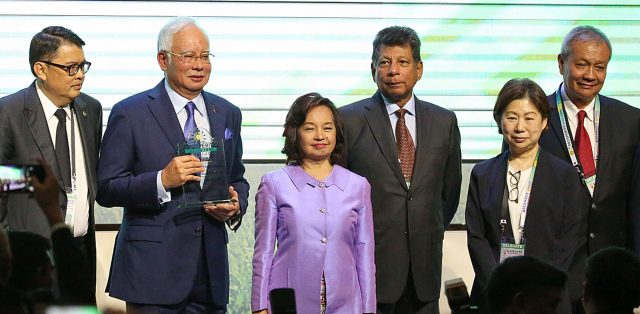
MANILA, Philippines — Policymakers agreed that policies granting access to digital technology, markets and mentorship will be crucial to empowering micro, small and medium enterprises, and spur inclusive growth in Southeast Asia.
At Friday’s Prosperity for All Summit, one of the events of the 30th Association of Southeast Asian Nations Leader’s Summit, former President Gloria Macapagal-Arroyo, now second district representative of Pampanga, picked up the point raised by Malaysian Prime Minister Najib Razak.
In a speech earlier in the event, Najib said: “We must deploy digital technology, this powerful force of economic innovation, to help us make the leap into that great future that ASEAN promises, and ensure that it is one of prosperity for all.”
“How do we give them higher value added not just to help the country survive but the help the country thrive? And Prime Minister Razak was very right when he said digital technology,” Arroyo said. “We have to bring them to world of digital technology.”
Arroyo stressed this includes building the needed infrastructure.
But Senator Paolo Benigno Aquino IV said the problem of accessing markets should be addressed first, noting that “a lot of our M and S, the micro and the small [enterprises], do have good products, they do have a lot of potential, but they are unable to access markets.”
While saying government has organized trade fairs to address market inaccessibility, he acknowledged that more focus should be given to opening up supply chains to micro and small businessmen, meaning convincing large companies to source their supplies and raw materials from MSMEs instead of importing these.
He said achieving this would provide an inclusive supply chain and, thus, prosperity for all.
He cited the case of Jollibee’s partnership with the farmers of Kalasag in Nueva Ecija, who were commissioned to grow onions for the fast-food chain.
The farmers were trained in finance, modern farming techniques and business practices, and supported by government agencies with microfinance. In just three years, their output increased by 300 percent — from 60,000 kilos of onions in 2008 to 245,000 kilos in 2011.
For Trade Secretary Ramon Lopez, the key is mentoring to empower MSMEs, especially micro enterprises, which account for a full 91 percent of small businesses in the country.
He pointed out that his office and Go Negosyo were pushing the idea of entrepreneurship, stressing that smarter entrepreneurs are the most dynamic and innovative business people in the country, the ones who often realize the unmet needs that make their products relevant in the market.
“And if you have entrepreneurs always thinking ‘What’s the next big thing that I can?’ then you really would have much (more) empowered micro, small and medium entrepreneurs,” he said.
This, he added, is where mentoring comes in.
The task, Lopez said, is to change mindsets and help entrepreneurs realize that there really is a science to doing trade and business, aside from educating them in financial literacy.
He also pointed to the need to provide free spaces for MSMEs to give their products more exposure instead of relying on brief trade fairs. He said some malls in the country are already providing this.
“Imagine a free space in the mainstream market that will enable micro entrepreneurs (to display) the best of their products, the best of their MSME products,” he said.
Lopez also set government will set aside funds to provide MSMEs low-cost financing to wean them away from the usurious “5-6” schemes they have relied on for lack of access to traditional sources of loans.









